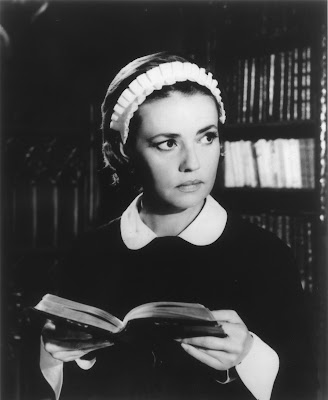There was no one like Jeanne Moreau, the grand dame of French cinema who died this past July 31 at the age of 89.
Petite, passionate, and overflowing with sensuality, Moreau became the muse of countless directors including New Wave pioneers Louis Malle (Elevator to the Gallows, The Lovers), Francois Truffaut (Jules and Jim, The Bride Wore Black) and Jacques Demy (Bay of Angels), as well as Michelangelo Antonioni (La Notte) and Orson Welles (Chimes at Midnight, The Immortal Story). In fact, Welles once described Moreau as “the greatest actress in the world.” And one who, shockingly, was never nominated for an Oscar nor a Golden Globe.
The Aero Theatre is paying tribute to the magnificent Moreau with a seven-film tribute “Jeanne Moreau Remembered,” opening this Thursday with the 2008 drama One Day You’ll Understand, directed by Amos Gitai, who will be appearing in person.
Friday’s offerings are 1961’s La Notte and Luis Bunuel’s 1964 Diary of a Chambermaid. Truffaut’s 1962 masterpiece Jules and Jim, which put Moreau on the international cinema map and 1963's Bay of Angels are on tap for Saturday evening. And the tribute ends on September 10 with Truffaut’s 1968 Hitchcock homage The Bride Wore Black and 1958’s Elevator to the Gallows.
Film critic Kevin Thomas, who reviewed films for nearly five decades at the Los Angeles Times and interviewed Moreau several times, chatted with me recently about Moreau’s importance.
“I think she was totally individual,” he noted. “I think she was a woman of tremendous passion. Not that she didn’t hold it in check, but she was passionate about life and about work. And she had an incredible sensuality. These are special qualities beyond obvious high intelligence and great talent.”
And that tremendous presence she exuded on-screen, she also had off-screen. “You knew you were with somebody really special,” said Thomas. “She was just entirely herself, absolutely totally herself.”
Moreau bristled when she was described as "the Bette Davis of France." “She hated that expression,” said Thomas.
“Their styles and their generations were two different things,” Thomas explained. “Jeanne was not mannered. She was much more natural. Bette had a very crisp, mannered style that sometimes could be overdone, especially if the material wasn’t strong enough to sustain the mannerisms.”
But that wasn’t the case of Moreau.
Thomas recalled a remark Candice Bergen made at a 1998 tribute evening at the Academy of Motion Picture Arts & Sciences to Moreau. Bergen told the sold-out crowd that her late husband Malle was “very impressed with what he called Jeanne Moreau’s existential walk” when they were making Elevator to the Gallows, which was his narrative feature debut.
That walk is very much in evidence in La Notte.
“La Notte is very important,” said Thomas. “That picture is like one big, long walk as she and Marcello Mastroianni are trying to salvage their marriage or find other loves in the course of this long, long walk that they take. She’s so expressive.”
And she’s incredibly sympathetic, noted Thomas in The Bride Wore Black, as a woman widowed on her wedding day who seeks revenge on the five men who killed her husband.
“It was an homage, not an emulation, of Hitchcock,” said Thomas. “Truffaut was a very different director from Hitchcock, almost opposite, but he thought Hitchcock was the greatest director in the world. He takes this Cornell Woolrich story from the ‘40s. It’s the ultimate revenge fantasy. Whereas maybe Hitchcock could magnificently avoid telegraphing plots and things like that, Truffaut let all the mechanisms and the relentless determinism of Woolrich’s novel to play. He let the telegraphing happen."
Because, noted Thomas, Truffaut wanted to concentrate on the emotions of the piece. “He had tremendous compassion for this woman on this revenge streak and he has compassion for her victims, too. It’s really an extraordinary work.”
As is the dark Bay of Angels, in which Moreau plays a compulsive gambler. “This is really a great film,” said Thomas. “She’s so compulsive she’s lost practically everything - her husband and child.”
But what is most striking, Thomas said, is Moreau's appearance. “With her bleached hair, feathered boa and long cigarette holder, she is the most sensational platinum blonde since Harlow. And then there’s the young man that she ensnares. She is as dangerous to this young man as a roulette wheel is dangerous to her.”
Thomas described Elevator to the Gallows as a taut, intricately structured thriller, in which "everything that could possibly go wrong, does.”
The film, he said, established Moreau as a star, launched Malle's career, and “helped usher in the French New Wave. Moreau comes across as a woman coolly risking all for love. The shifting moods are accented by a score composed and performed by Miles Davis. The score was really extraordinary.”
Moreau once told Thomas: “’I love making films. Making films is an adventure and I love adventure.’ I really think that said something to how she she approached it all.”
Veteran journalist Susan King wrote about entertainment at the Los Angeles Times for 26 years (January 1990 - March 2016), specializing in classic Hollywood stories. She also wrote about independent, foreign and studio movies and occasionally TV and theater stories. She received her master's degree in film history and criticism at USC. After working 10 years at the L.A. Herald Examiner, she moved to the Los Angeles Times.













No comments:
Post a Comment